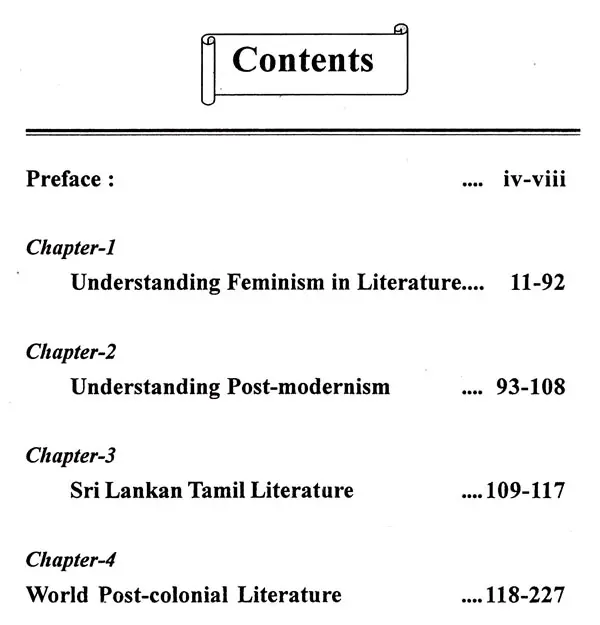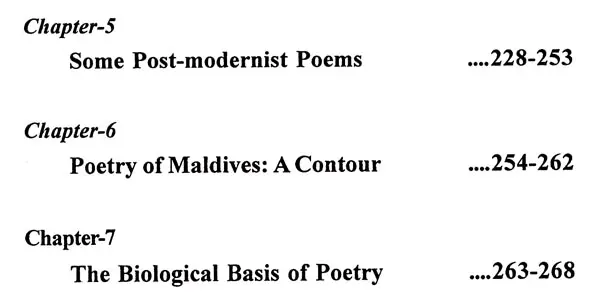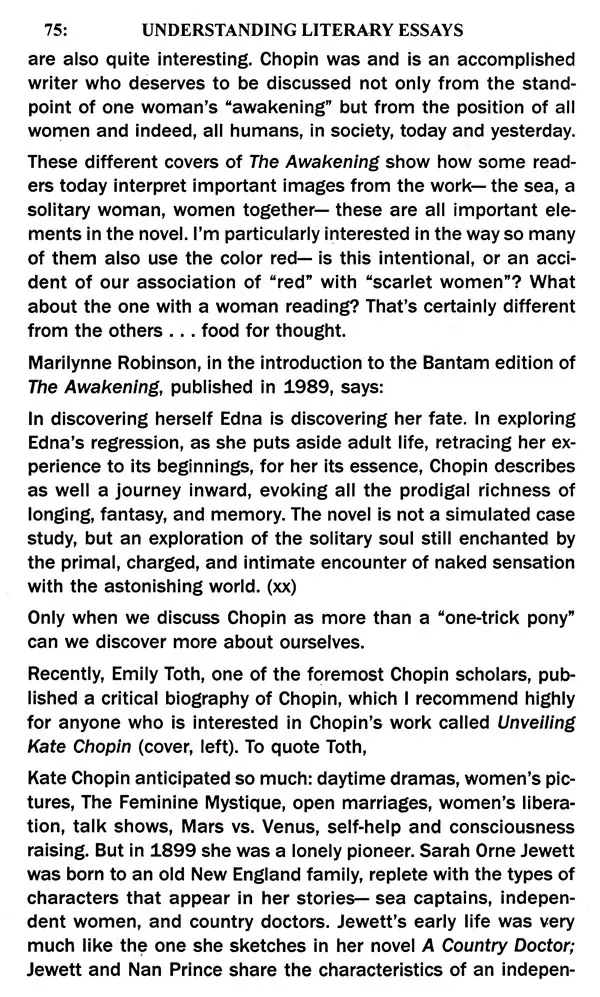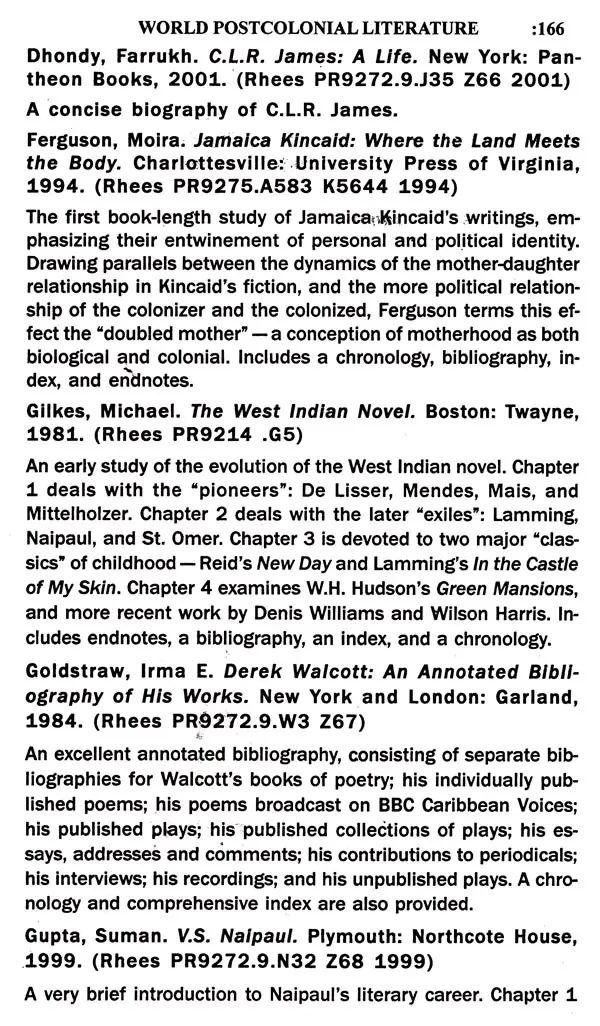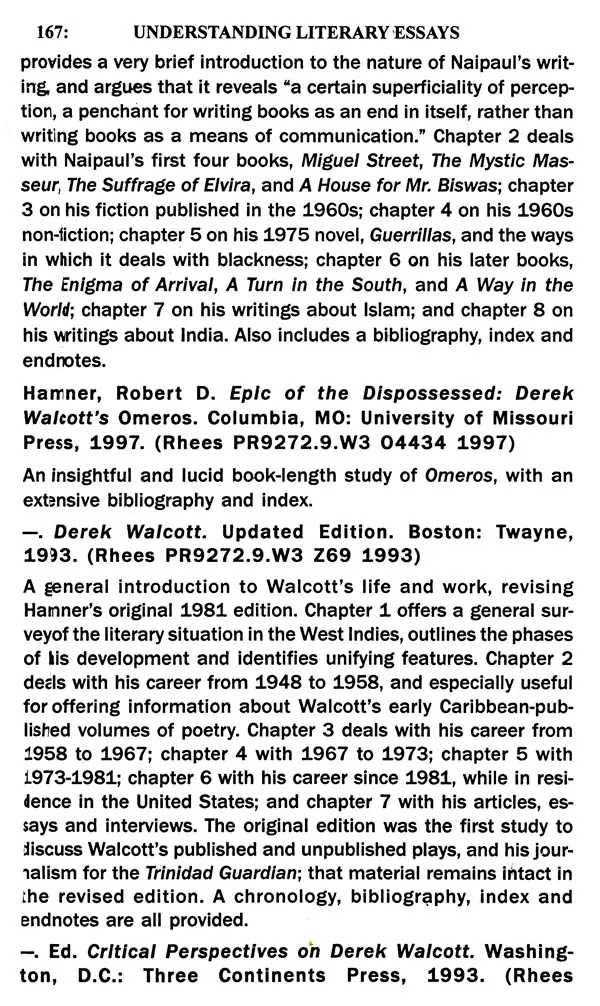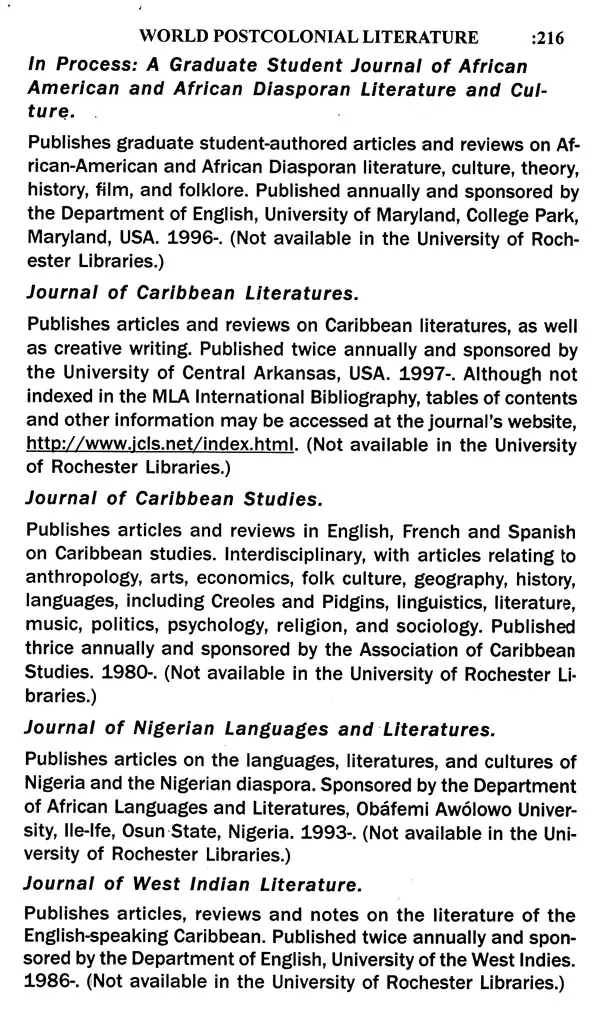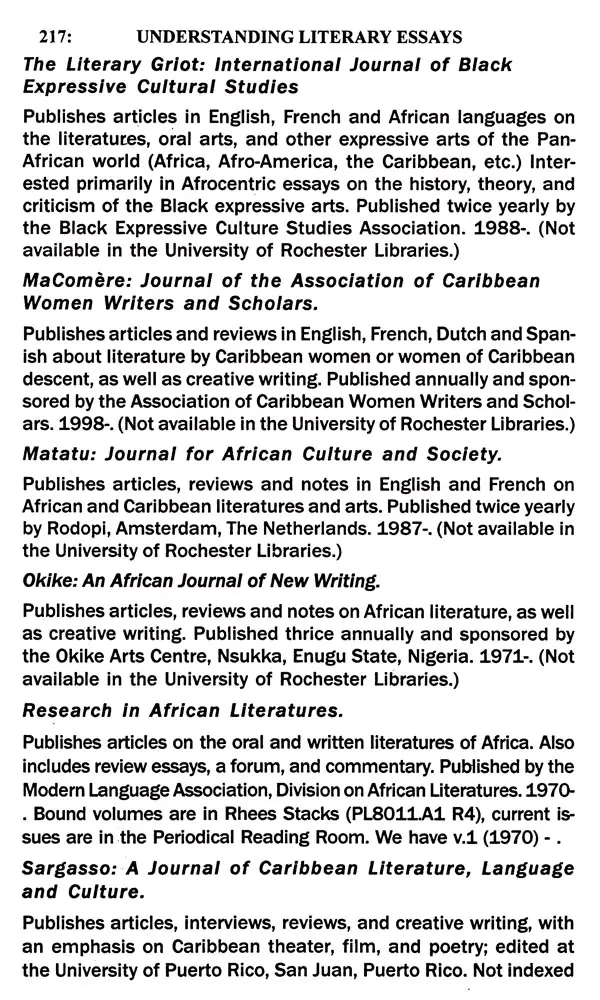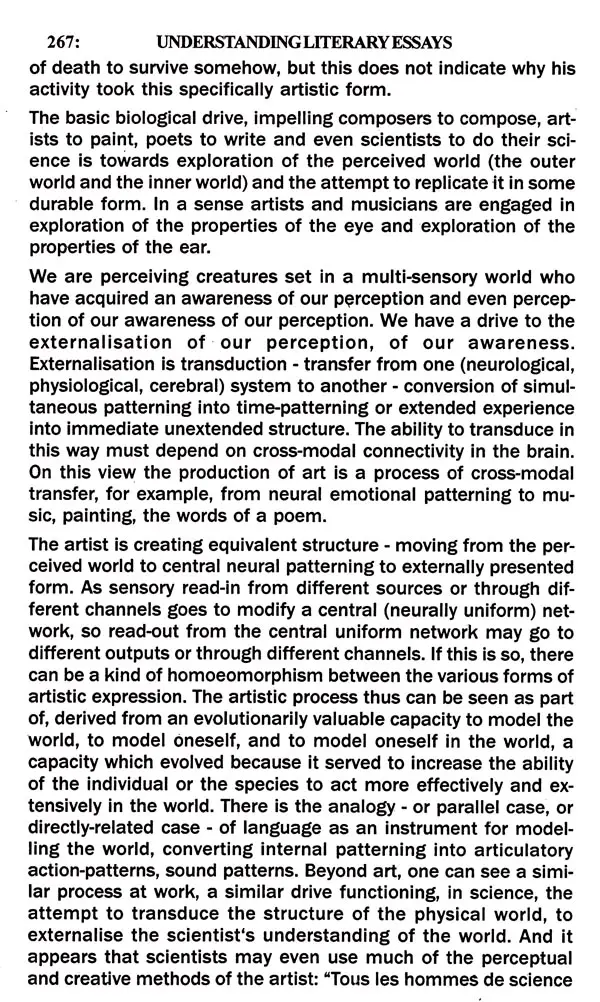
Understanding Literary Essays Feminism Post-Modernism and Post-Colonial Studies
Book Specification
| Item Code: | UAG244 |
| Author: | S.K. Paul |
| Publisher: | KALA PRAKASHAN |
| Language: | English |
| Edition: | 2009 |
| ISBN: | 9788189921606 |
| Pages: | 268 |
| Cover: | HARDCOVER |
| Other Details | 9.00 X 6.00 inch |
| Weight | 410 gm |
Book Description
"UNDERSTANDING LITERARY ESSAYS FEMINISM, POST-MODERNISM, AND POST-COLONIAL STUDIES" IS PRIMARILY A BOOK WHICH IS DEDICATED TO THE STUDENTS OF ENGLISH IN VARIOUS COLLEGE AND UNIVERSITY LEVELS IN INDIA AND SAARC COUNTRIES. The young generation must be acquainted with latest theoretical and generic developments and changing of ideas in this fastest growing high-Tec-cyber world of today. This book also provides essays on postmodernism, feminism, post colonialism, postmodernist sample poems, biological aspects of literature, and a few ruminations on the SAARC literature. In literature ideas of being a common human being remains the same down the ages, only fashion, form and formatting is changed. All, what I have attempted to discuss is how to transform the formation and vise-versa. I am but all to reinterpret what the Victorian Age in England had mused. Then it was just an amusement. I am just going to serve old wine in a new bottle.
The book is designed with the following literary essays as-
(1) Understanding Feminism in Literature
(2) Understanding Post-modernism
(3) Sri Lankan Tamil Literature
(4) World Post-colonial Literature
(5)Some Post-modernist Poems
(6) Poetry of Maldives: A Contour
(7) THE BIOLOGICAL BASIS OF POETRY
(8)"UNDERSTANDING LITERARY ESSAYS FEMINISM, POST-MODERNISM, and Post-Colonial Studies’’
Dr. S. K. Paul, is an internationally famed poet, novelist and modern critic. He is known for his masterpiece, "The Complete Poems of Rabindranath Tagore's Gitanjali: Text with Evaluation" which is included in the reference section of Heidelberg University, Germany. His novel, "Safari" clicked the attention of students in India and abroad. His other books are; "Ideas and Ideology of George Bernard Shaw", Complete Poems of Rabindra Nath Tagore's GITANJALI, "Recritiquing Rabindra Nath Tagore", "Grammar and Language in Elizabethan and Romantic Literature"
"Recritiquing John Keats", "New Lights on Indian Woman Novelists in English"
"Feminism in Indian Writing in English",
"Two Essays on Shakespeare and E. M. Forster-A critical study
"Midland Hope - An anthology of English poems"
"Madhumaya Prantik"-A collection of Hindi poems
"Kaal Kut"-2nd collection of Hindi poems,
"Reassessing British Literature",
"Understanding Literary Essays Feminism, Post-Modernism & Post-Colonial Studies". Indian Poetry in English: Roots and Blossoms
In addition to these, Dr. Paul is in the editorial board of different journals published from India and abroad. He is a multi-lingual. At present he is teaching English in B. R. A Bihar University, Muzaffarpur, Bihar.
Since my ASRC Hyderabad day that is in mid nineties from 1995-1999,1 I came in contact with many scholars from different parts of the country and abroad. As its name ASRC (American Studies Research Center) signifies the recent studies of literary canons, genre, various socio-ethnenic movements mainly concerned with America and Asio-African counties and Asian Studies was the focus of very common interest and usual discourse. I had had my chance for several times to visit this Super-modelled learning center amidst Osmani University Campus there. Post modernism, deconstructionalism theory of Derrida, Feministic studies, Post colonial literature and above all Black literature and New-historicism were the catch words that would be agog and reverbrating everywhere- from dining hall to the Library Lounge and Lobby. To see a vast infra-structure of varieties of books, journals, periodicals and dictionary of glossaries on different discipline. Besides this, the ASRC provided me with sets of Computers to aid me.
Being inspired by my golden lawns of the past I decided to write this book as a collection of critical essays on postmodernism, feminism, post colonialism and deco structural flavor and technique in presenting a few of my poems. As we envision the postmodern imperium of a global media culture we are caught at the cusp of a dilemma. For sure, we recognise the difference between, on the one hand, the 'new virtual communitarians' benignly homesteading on the Net, sharing herbal remedies and ecological aperçus, and, on the other hand, ferocious neo colonialists like the Australian Rupert Murdoch and the Canadian Lord Thompson, who, you might say, represent the belated revenge of settler colonial-late-capitalism upon the rest of the world! Part of us willingly grabs the 'virtual reality glove; while the colder eye contemplates the withered hand within. However wondrous the protean possibilities of on line ontologies (you need not be who you say you are), or of e-mail epistemologies (what you see is not what you get, or need to know!), there is a danger that the instant simultaneity so often celebrated on the Net in the name of instant 'connectivity', may drain everyday life of its historical memory and its capacity to register the contentions of cultural difference. Cyberspace culture, or 'virtual communities', too often find their
"Biological imagery is often more appropriate to describe the way cyber culture changes," writes Howard Rheingold in The Virtual Community, Homesteading on the Electronic Frontier: ".... Think of cyberspace as a social petri dish, the Net as the agar medium, and virtual communities, in all their diversity, as the colonies of micro-organisms that grow in petri dishes.... wherever CMC technology becomes available to people anywhere, they inevitably build virtual communities with it, just as micro organisms inevitably create There is, certainly, widespread concern amongst 'virtual communitarians' about the illusory reality of on-line culture. However, the organic or biological metaphor through which the concepts of community and communication are constituted - both as media and mediation does not permit the life world of cyberspace to approximate the complications and contentions of global community as we know it. Only too often, as Paul Gilroy has written, the solidarity of proximity yields to the faceless subjectivity of communicative technologies like the internet.
However, before the celebration of global connectivity becomes more vaunting, let us spin the globe to reveal another view of culture and community in our time. In counterpoint, there emerges a discourse of community that provides a more modest moral measure against which transnational cultural claims and demands may be measured. I am not proposing a self-righteous moralism where ready references to the authenticity or everyday reality at the 'vocal' level prevails against our takIng a more exacting ethical view of the global order. It is the stance that we take, the place where we locate ourselves - our locality that determines how we may conceive the global. For as we reach out to touch the new geo-political surfaces and cultural circumferences that are offered to us through the rhetoric of the 'global' we often lose a tangible connection, and are thrown back, willy nilly, on a limiting national perspective in the most affected areas of our lives. This does not mean that we should be Luddites, and fail to see what is opening up before us a world of more complex boundaries, where we are forced to stretch out.
**Contents and Sample Pages**

